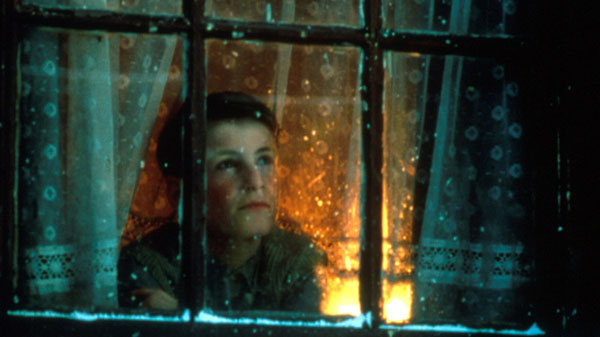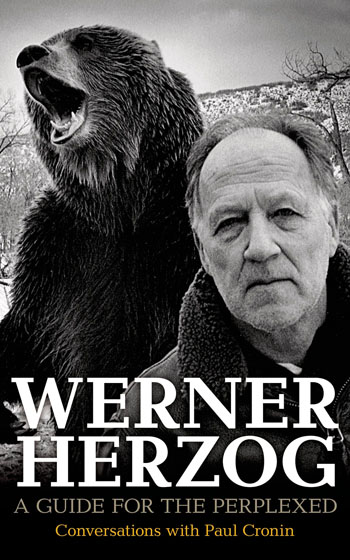Michael Koresky’s Terence Davies will be out next Monday and the Brooklyn Rail is running an excerpt in which the Reverse Shot co-founder “analyzes how Davies’s ongoing negotiation of—and struggle with—questions of identity related to his past and his homosexuality imbue the details and jarring juxtapositions in his films with a queer sensibility, which is too often overlooked due to the complexity of Davies’s work and his unfashionable ambivalence toward his own sexual orientation.”
On Wednesday, Davies will be at the ICA in London for a Q&A following a screening of The Long Day Closes (1992).
Jonathan Rosenbaum for Sight & Sound: “There has been a slew of important books lately devoted to post-60s Godard, including Daniel Morgan’s Late Godard and the Possibilities of Cinema, Jerry White’s Two Bicycles: The Work of Jean-Luc Godard and Anne-Marie Miéville, and Godard’s own Introduction to a True History of Cinema and Television, translated by Timothy Barnard—the latter including Michael Witt’s introductory, 55-page ‘Archaeology of Histoire(s) du cinéma.’ But none seems quite as durable, both as a beautiful object and as a user-friendly intellectual guide, as Witt’s superbly lucid, jargon-free book about Histoire(s) du cinéma, Jean-Luc Godard, Cinema Historian.”
David Bordwell, by the way, has just posted an entry on Godard’s Adieu au langage, calling it “the best new film I’ve seen this year, and the best 3D film I’ve ever seen.” We’ll take a closer look at this essay when the next Adieu entry goes up, but for now, I’m sure you’d want to know.
Meantime, Jonathan Rosenbaum has also posted his 1995 review of James Naremore’s The Films of Vincente Minnelli (“In effect, Naremore organizes his entire study around the image of a shop window”) and a fresh recommendation, Vincente Minnelli: The Art of Entertainment, “a terrific critical collection.”
“The interview book is a venerable genre of film criticism,” writes Peter Tonguette in the Wall Street Journal. “François Truffaut‘s Hitchcock, Peter Bogdanovich’s John Ford and Gavin Lambert’s On Cukor are distinguished as much by the firm hand of the questioners, leading the reader through the major works and the sometimes forgotten ones, as by the answers of the directors. But does the world need a book of conversations with Werner Herzog?” Tonguette finds that Paul Cronin “will never be mistaken for a disciplined interviewer, or a particularly tough one,” and that Werner Herzog: A Guide for the Perplexed “is a book for the director’s followers, keen to be seen carrying a souvenir of their hero.”
But Hannah McGill, writing in the Independent, finds that “Herzog simply seems to have unlimited enthusiasms—art, music, literature, science, history—and extraordinary recall in talking about them.” What’s more, “Cronin has elicited extraordinary responses with simple but sharp-edged questions, and undertaken with skill and precision what must have been a behemoth of a selection, editing, fact-checking and indexing job.” James Camp attended a reading of passages from the book on Thursday night—by Herzog himself, on the eve of his 72nd birthday—and reports for the Guardian. Meantime, Erich Kuersten reviews Shout! Factory’s Herzog: The Collection.
Glad to see that Jason Sperb is garnering strong reviews for his new book, Blossoms and Blood: Postmodern Media Culture and the Films of Paul Thomas Anderson.
Ted Lewis’s “Get Carter (which inspired the 1971 Michael Caine film and has just been reissued in paperback, with a foreword by the movie’s director, Mike Hodges) operates in a lineage going back to Raymond Chandler and Jim Thompson, rather than British writers such as John Buchan and C.K. Chesterton,” writes David L. Ulin in the Los Angeles Times. “If he has a contemporary analogue, it may be Derek Raymond (author of the Factory novels), but Raymond was after something else. No, as far as classic hard-boiled fiction, Get Carter is sui generis, the place where British noir begins.”
For news and tips throughout the day every day, follow @KeyframeDaily. Get Keyframe Daily in your inbox by signing in at fandor.com/daily.





